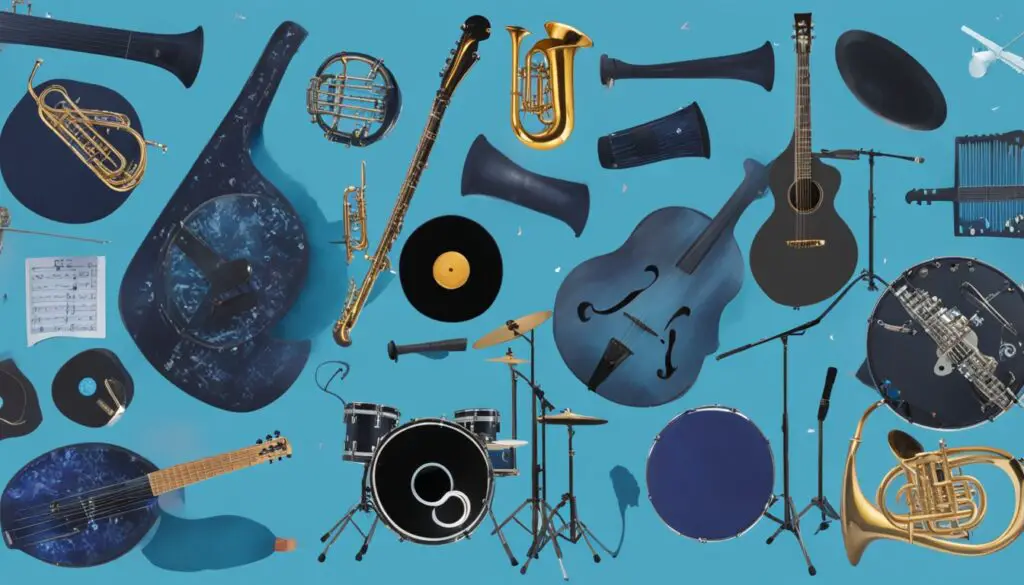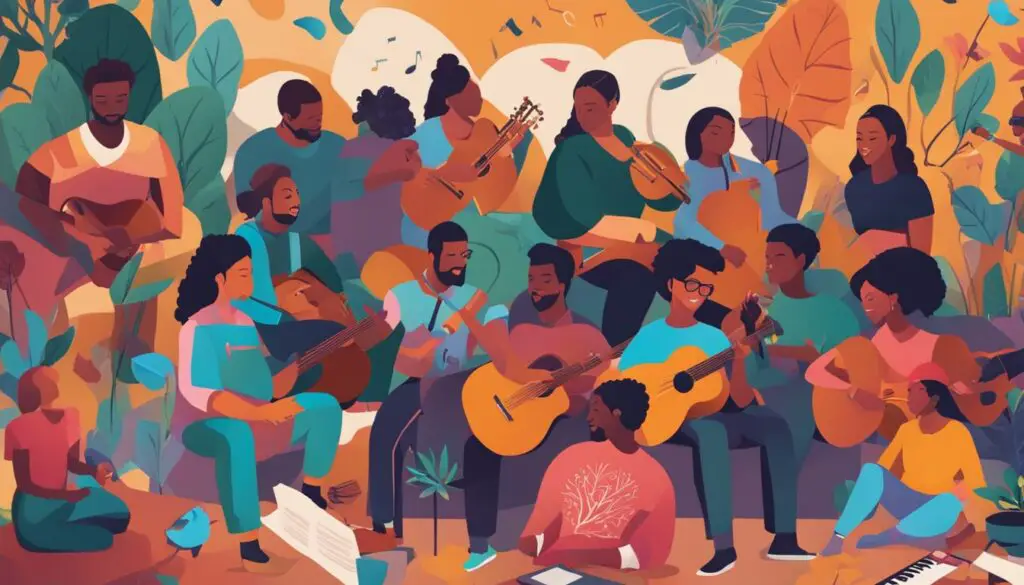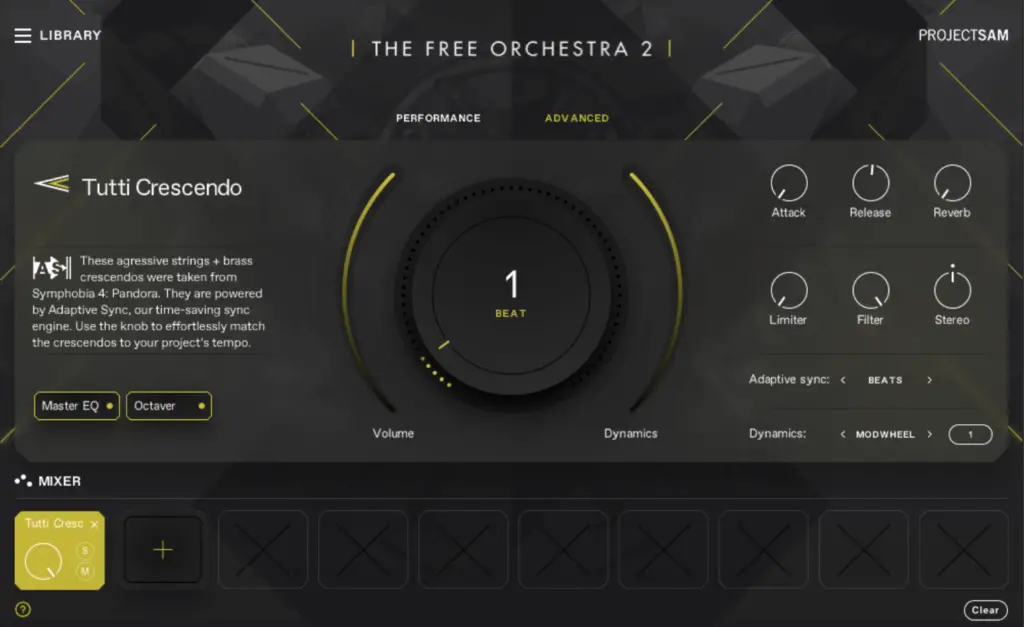One in four workers in the UK face issues like depression, anxiety, and stress each year. This shows the urgent need to care for the mental health of music artists and those in their field. Thankfully, there are many mental health resources and support services available in the UK for people in the music sector.
This guide will look at many helpful services. There are confidential helplines, specialist groups, and online directories. Plus, support networks, training, and initiatives focusing on mental health are available. From immediate crisis help to ongoing therapy and wellness workshops, this guide explores a host of resources.
Key Takeaways
- Music artists in the UK have access to a wealth of mental health resources and support services to prioritise their emotional wellbeing.
- These resources cover a diverse range of options, including confidential helplines, specialist organisations, online directories, support networks, training programmes, and workplace initiatives.
- The support available spans free 24/7 crisis support, targeted therapy, mindfulness workshops, and industry-led welfare schemes.
- Music professionals can find help for a variety of mental health challenges, from depression and anxiety to addiction and suicidal thoughts.
- By utilising this extensive ecosystem of support, music artists can safeguard their mental health and sustain successful, long-term careers in the industry.
Introduction
Working in music can bring great rewards but comes with tough demands too. Music artists and pros have their mental health tested by things like heavy pressure to perform, not knowing where their next pay check will come from, lots of travel, and always being watched. Keeping mentally well is key for them to have long, successful careers.
The Importance of Mental Well-being for Music Artists
The well-being of music artists is so important because how they feel affects their music and career. By caring for their mental health, they can better manage stresses like performing and never-ending tours. This helps them make better music and be more successful.
Challenges and Stressors Faced by Music Professionals
Professionals in the music business face a range of mental health challenges. These include the stress of performances, being in the public eye, money worries, and always being on the road. It’s important to take these challenges seriously and find ways to overcome them, to support the well-being of everyone in the industry.
Overview of Available Resources and Support Networks
In the UK, there’s a lot of help for music professionals who need support for their mental health. From places they can talk in private to therapy and industry-backed welfare, there are many paths to take for help. This outlines the main support available to those in music.
Confidential Helplines and Crisis Support
Music artists and industry professionals facing a mental health crisis need not feel alone. Several confidential helplines are available for urgent emotional support. These services are a crucial resource for those battling mental wellbeing issues in the music industry.
Music Minds Matter Helpline
The Music Minds Matter helpline is run by Help Musicians, a charity. It offers free, 24/7 support from accredited counsellors to anyone in music. It’s a confidential and vital service for music pros needing immediate crisis help or just someone to listen to their concerns.
Music Support Helpline
Music Support runs a helpline during the work week for those in music facing mental health or addiction challenges. This service provides a confidential environment. It helps music professionals by offering guidance and linking them to further support.
CALM Suicide Prevention Helpline
The CALM suicide prevention helpline is available every day from 5pm to midnight. It’s a confidential service for UK residents with suicidal thoughts or in a crisis. This lifeline is vital, especially for those in the music industry, offering support when they need it most.
Organisations Providing Mental Health Services
Many groups offer mental health help to music artists and industry experts. The
British Association for Performing Arts Medicine (BAPAM)
gives free healthcare to performers. This includes check-ups, advice, and treatment. They understand the unique needs of those in the
performing arts
Music Industry Therapist Collective (MITC)
A team of therapists from the
music business
formed the
Music Industry Therapist Collective (MITC)
. They now provide therapy, counselling, and wellness help for
music industry
professionals. You can also turn to the
mental health charity Mind
for various support resources and services. They offer helplines and local support that can be very useful for
music artists
| Organisation | Services Provided | Contact Information |
|---|---|---|
| British Association for Performing Arts Medicine (BAPAM) | – Free specialist healthcare assessments and treatment – Advice and support for performers |
Website: www.bapam.org.uk |
| Music Industry Therapist Collective (MITC) | – Psychotherapy and counselling – Wellness programmes for music industry clients |
Website: www.musicindustrytherapistscollective.co.uk |
| Mind: The Mental Health Charity | – Helplines and crisis support – Local support services – Online resources and publications |
Helpline: 0300 123 3393 Website: www.mind.org.uk |

mental health resources, music artist support
In the UK, there are many online directories available for music artists. They can find therapists and counsellors. These professionals have experience working with music industry people. The directories are tailor-made to meet the unique mental health needs of artists from different backgrounds.
Online Directories of Therapists and Counsellors
The BAATN directory includes therapists from Black, African, Asian, and Caribbean backgrounds. They help BAME music artists deal with their specific issues. Other resources like the Black Minds Matter UK network and the Black Trans Foundation offer support for the mental health needs of LGBTQ+ and BAME music professionals.
Resources for Specific Groups (LGBTQ+, BAME, Young People)
Alongside these directories, there are self-help guides and books available too. They provide vital advice and strategies for those in need. For example, the “Touring & Mental Health: the Music Industry Manual” and the “Young Freelancer’s Guide to Mental Health and the Music Industry” are packed with great advice.
Self-Help Guides and Publications
Using these resources, UK music artists can improve their mental well-being. They can find the help they need to do well in their careers.
Support Networks and Peer Groups
Music artists can gain a lot from joining support networks and making friends in the industry. Peer groups help fight isolation and provide a deep understanding. They give a chance to share stories, get advice, and support each other’s mental health.
Royal Society of Musicians Telephone Support Network
The Royal Society of Musicians has set up a phone network for its members. Here, artists can check in with each other. It’s a way for musicians to connect, share feelings, and support each other emotionally.
Music Support 12-Step Support Group
Music Support, a UK charity, runs online 12-step groups for those in the music world facing mental health or addiction. These meetings are safe and private. They help members work on their issues with a supportive circle of friends.
Online Forums and Communities
There are also online groups where music professionals can find support. Even though they’re apart, these forums and communities connect them digitally. Artists can still share, get help, and support one another in handling their mental health.
Training and Workshops
Music artists and professionals can improve their mental health with special training and workshops. These are offered by the British Association for Performing Arts Medicine (BAPAM). They cover topics like how to lower stress, create healthy habits, and stay emotionally strong. Such resources are key for music pros to take great care of their mental wellbeing.
BAPAM Online Courses and Events
The British Association for Performing Arts Medicine (BAPAM) holds online courses and events for mental health. Music artists learn about stress management, healthy routines, and becoming emotionally stronger. Participating in these helps music pros gain the skills they need to keep their mental health a top priority.
Mindfulness and Meditation Workshops
Tonic Rider provides special mindfulness and meditation workshops for music makers and performers. These help them learn to handle stress, boost focus, and look after their mental and emotional health. The workshops give important skills to support their mental health in their career.
Tonic Rider Training and Resources
Tonic Rider is at the forefront, offering mental health education for the music scene. They have special workshops focusing on mindfulness and meditation. These teach musicians how to deal with performance anxiety, stress, and other mental health issues. Engaging with Tonic Rider’s work is a positive step towards managing mental health.

Workplace Support and Industry Initiatives
Many groups in the music industry now look out for their members’ mental health. For example, the PRS Members’ Fund gives free counselling to PRS for Music members who qualify. The Musician’s Union helps too, by offering mental health resources and advice on their site.
PRS Members’ Fund Mental Health Support
The PRS Members’ Fund is linked to PRS for Music. This charity knows how crucial mental health support for music artists is. It offers private talks and more to those who are PRS for Music members. This special help tackles the mental challenges that people in the UK music industry might face.
Musician’s Union Mental Health Resources
The Musician’s Union stands with musicians and music pros. On their website, they share lots of mental health resources. You can find tips on handling stress and finding help to keep well. By doing this, the Musician’s Union shows they want their members to be healthy and happy.
Promoting Mental Health Awareness in the Music Industry
The music world is working together to make mental health less of a taboo. Groups such as the PRS fund mental health services and the Musician’s Union mental health resources are key. They help make talking about mental health normal and encourage music artists to take care of themselves.
Self-Care and Preventative Measures
Music artists can take steps to look after their mental well-being. They should eat well, exercise, and get enough sleep. These things can help them deal with stress and burnout.
They should also try stress management techniques like mindfulness and relaxation. These can make a big difference.
Maintaining a Healthy Lifestyle
For good mental health, it’s vital to be physically healthy too. Artists need to exercise, eat balanced meals, and sleep well. This will reduce stress and burnout they often face.
Stress Management Techniques
Having ways to deal with stress is important. Mindfulness and meditation are two great techniques. They can bring more calm into the bustling life of a music professional.
Cultivating Resilience and Emotional Intelligence
Building resilience and emotional intelligence is also critical. This means knowing how to handle stress and tough times. It prepares artists to deal with the pressures and obstacles in their work.
Conclusion
The UK music industry has a wide range of mental health resources. These are there to help artists and musicians, among other professionals. Confidential helplines and specialised therapy are just some of the help available.
Artists can use these services to look after their mental health. They can also learn to be stronger and keep going in their challenging careers. These supports are key for anyone in the music business.
For music pros, 24/7 helplines are vital. Services like Music Minds Matter and Music Support offer counselling and more. They are set up for the unique needs of those in music.
Bodies like BAPAM and MITC, along with charities like Mind, provide specialist help too. These services are meant just for music artists and those in the industry. They’re here to support you in the tough times.
More and more, the music world is focussed on mental health. Thanks to groups like the PRS Members’ Fund and the Musician’s Union, help is at hand. Plus, there’s training in building resilience and taking care of yourself.
All in all, the music industry in the UK is doing its bit. It’s boosting its efforts to look after the mental health of those within it. With more help coming from within, the future looks brighter for all in music.
FAQ
What are the confidential helplines available for music artists in the UK experiencing mental health crises?
What organisations provide mental health services specifically tailored for those working in the music industry?
How can music artists find therapists, counsellors and other mental health professionals with experience in the music industry?
What kind of support networks and peer groups are available for music artists to combat isolation and access emotional support?
What training programmes and workshops are available to help music artists develop practical skills and strategies for maintaining good mental health?
What industry-led programmes and resources are available to support the mental health of music professionals?
How can music artists proactively care for their mental health through self-care practices and preventative measures?
Source Links
- https://www.ukmusic.org/advice/mental-health/
- https://musiciansunion.org.uk/health-safety-wellbeing/mental-health-and-wellbeing/mental-health-support
- https://www.musicsupport.org/resources/
- https://musiciansunion.org.uk/career-development/career-guides/musicians-wellbeing-guidance-pack/musicians-and-mental-illness-what-is-being-done-to-help
- https://www.bapam.org.uk/mental-health-support-at-bapam/
- https://www.bapam.org.uk/mental-health-and-wellbeing-services-for-performing-artists-guidance-for-the-performing-arts-sector/
- https://musiciansunion.org.uk/news/tonic-rider-launches-peer-support-groups
- https://musiciansunion.org.uk/health-safety-wellbeing/health-and-safety/healthcare-services-for-musicians
- https://www.musicmark.org.uk/resources/supporting-wellbeing-and-mental-health/
- https://www.mind.org.uk/media/8459/mind-mental-health-guide-for-organisations-final.pdf
- https://musiciansunion.org.uk/health-safety-wellbeing/mental-health-and-wellbeing/musicians-wellbeing-guidance-pack
- https://www.getalternative.com/we-need-more-music-industry-investment-in-mental-health/
- https://www.prsformusic.com/m-magazine/features/not-alone-help-musicians-suffering-mental-health-issues



